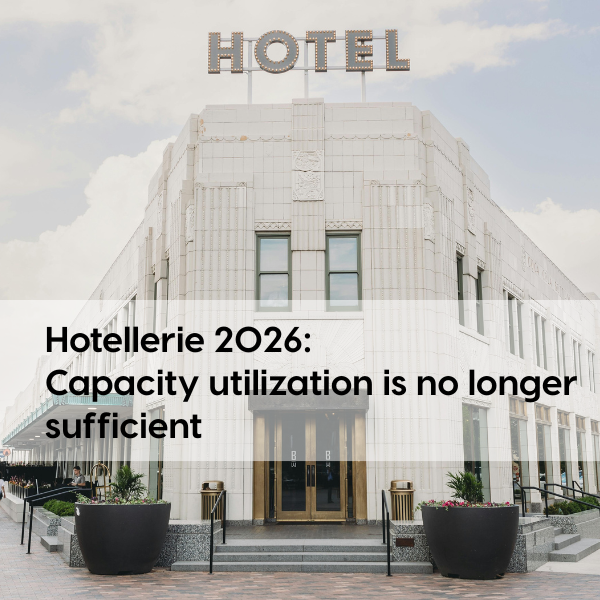Technology
Between man and machine
How artificial intelligence is changing the hotel industry
.png)
The hotel industry is at a turning point: Digital tools and AI are taking on routine tasks — and thus creating more time for what really counts — the guest. Discover how smart technology such as profitize provides the perfect balance between efficiency and friendliness and makes the hotel industry future-proof.
The breakfast room of a Tyrolean hotel is hustle and bustle. Waiters serve coffee, and buffets serve more. But what the guests don't see: In the background, an AI-supported system is already analyzing stocks for the next day. It reports which foods are becoming scarce, how many guests have signed up for breakfast, and gives the kitchen team clear recommendations. “It used to take a lot of time for manual comparisons,” says Hotel Director Sabine M. “Now the system provides us with the information we need at a glance. ”
Scenes like this are no longer an exception. According to one current Gartner survey from January 2024 set 40 percent of companies generative AI is already being used in more than three business areas, and almost two thirds are using it in several departments. In the hotel industry, the trend is clear: AI is not an end in itself, but a tool, which relieves employees of routine activities and thus enables them to focus on personal guest service.
Practical applications — from reception to financial planning
Current industry data from Hospitality Industry Trends for 2025 — Oracle and Skift show: Over half of travelers prefer contactless check-in as standard, and 49.1 percent want contactless payments permanently. Hoteliers are therefore increasingly investing in self-service technologies and contactless processes that not only increase efficiency but also meet guests' expectations.
But automation in no way means making personnel redundant. As the study points out, the aim is to perform routine tasks for employees using digital tools that enable teams, for example, to efficiently handle room status updates or shift changes. This creates space for the essentials: personal contact with guests.
Even in the area of Hyperpersonalization The potential of AI is becoming apparent. Systems that create personalized entertainment options and offerings through big data and machine learning are increasingly becoming the standard. Guests receive tailor-made recommendations based on their previous stays and preferences — a trend that not only individualizes service but also increases guest satisfaction.
Behind the scenes, the hotel industry is increasingly using smart technologies to reduce the complexity of financial planning to master. Platforms such as profitize make it possible to seamlessly link financial data from various systems — such as PMS, POS and HR. The results are precise forecasts and data-based recommendations that help hoteliers keep an eye on costs and make well-founded decisions. “I can now concentrate better on strategic issues instead of struggling through Excel spreadsheets,” reports a hotel owner from Austria.
Employees as the key to successful integration
How Olga Heuser, CEO of DialogShift, emphasizes, acceptance by employees is crucial for the success of AI solutions. Only when systems can be operated intuitively and offer tangible added value can they be successfully integrated into everyday life. The DialogShift guide makes it clear that AI-based systems primarily perform repetitive tasks — from answering standardized inquiries to the automated creation of forecasts — and thus create time for personal service to guests.
Digitalization as an answer to the shortage of skilled workers
The results of the latest Oracle & Skift Study 2025 underline that new technologies bring much more than efficiency gains. More than two thirds of the hoteliers surveyed see digital solutions such as mobile applications and automation as a strategic opportunity to counteract the increasing shortage of skilled workers. Digitalization is therefore seen not only as a measure to increase efficiency, but also as a decisive competitive advantage in attracting and retaining talent.
Technology as a tool, people at the center
Despite the euphoria surrounding artificial intelligence, one thing remains clear: It is a tool that makes processes more efficient and predictive — but not a substitute for humans. It relieves employees of routine tasks, creates transparency in complex processes and supports well-founded decisions — from guest services to financial planning. “AI helps us react faster to changes,” explains a finance manager from an international hotel group. “But in the end, we need people who implement these decisions responsibly and bring a personal touch to the guest experience. ”
In an industry that focuses heavily on service quality and individuality, the real art lies in using technology as a tool — not as an end in itself. It gives employees the chance to concentrate on what makes the difference: personal contact, hospitality, small gestures.
Oder kontaktieren Sie uns.
Simply contact us via email. We look forward to hearing and reading from you.
hello@profitize.io

.png)

.png)
.png)
.png)
.png)
.png)
.png)
.png)

.png)
.png)
.png)
.png)
.png)
.png)
.png)
.png)
.png)
.png)

.png)
.png)
.png)
.png)
.png)

.png)
.png)
.png)


.png)
.png)
%20(600%20x%20400%20px).png)
%20(800%20x%20600%20px).png)

.png)



.png)



